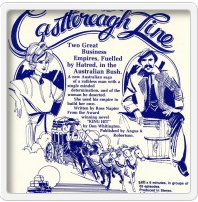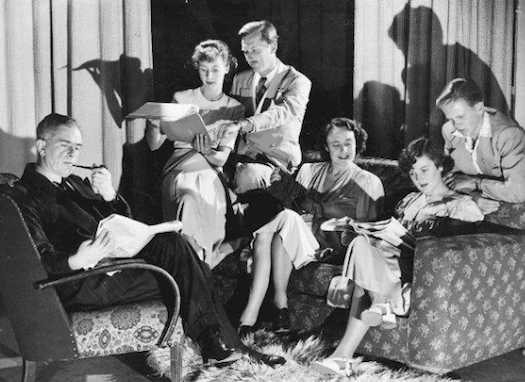Opinion from Peter Saxon on the RN decision to axe radio drama. In 1972, when I first stumbled into a radio studio as a young ‘rocky jockey’ at 2XL Cooma, which just last month celebrated its 75th birthday, radio serials were the order of the day in the “women’s shift,” now known as “mornings” in this post feminist era.
Soaps like Dr Paul and Portia Faces Life, both produced by Grace Gibson Productions, had survived the cut imposed by television, since its inception 15 years before.
Blockbuster US shows that were radio’s bread and butter like Superman and The Lone Ranger had migrated to TV long ago, yet Australian drama such as Dr Paul and Portia Faces Life ran for 20 plus years. For all that, they didn’t come close to the longevity and popularity of Blue Hills on ABC Radio.
Blue Hills was an institution. Its 15 minutes a day, written by Gwen Meredith, was produced for 27 years straight, from February 1949 to September 1976. It ran for a total of 5,795 episodes telling the tale of a group of residents in a typically fictitious Australian country town called Tanimbla. “Blue Hills” itself was the residence of the town’s doctor.
The show, over time, nourished scores of actors including Ray Barrett, John Meillon, Gwen Plumb, June Salter and one of Australia’s biggest exports to Hollywood, Rod Taylor.
“Its listeners so identified with the characters on the show,” says researcher Ingrid Just, “that ABC had to hire more staff to deal with fan mail sent to the show’s fictional characters.”
“People sent in birthday cards, get well soon cards, baby clothes and even ration stamps for characters who were struggling,” Ingrid says.
But on September 30, 1976 Blue Hills came to an end with the last episode, the last vestige of a format that reminded our parents of an era where Radio was the only electronic media in a slower moving, simpler world.
It wasn’t over yet.
 Such was the gap left by the passing of Blue Hills that Grace Gibson produced a new dynasty style program in the 1980’s called The Castlereagh Line by Ross Napier. It ran for 910 episodes.
Such was the gap left by the passing of Blue Hills that Grace Gibson produced a new dynasty style program in the 1980’s called The Castlereagh Line by Ross Napier. It ran for 910 episodes.
To this day, if you listen closely to 3AW or 2CH late at night you can hear the ghosts of episodes past as they rotate through the 910 that were amde again and again. While the 19th century story settings can never age, the production values, like crows feet around ones eyes, are tell tale signs of age.
Since last century, as far as I am aware, epic radio serials, like steam trains, are no longer in production.
Yet, the ABC has been determined to at least keep the idea of radio drama alive, although not in serial form, and has done so through Radio National’s Airplay program.
As of yesterday, that’s coming to an end too.
Radio National manager Michael Mason broke the news to staff in a memo …
“Radio National will no longer include radio plays or book readings on its schedule in 2013.
“We understand that this is a break with a very long-standing tradition, and will directly affect a number of staff.
“In the context of the broader RN offer, maintaining an innovative and creative output for our audience, and considering financial constraints, we believe that the time has come to move away from this output.
“Radio plays and book readings have, for many years, faced declining audience numbers, while remaining an expensive activity for the network.
“We continue to believe very strongly that ratings are not the only measure for RN, but the decline in listenership does indicate a lack of engagement in radio plays amongst our audience,” said Mr Mason.
No doubt many will lament its passing – particularly those who see radio, and even more particularly the ABC – as a rock of stability in their lives…a voice that is always there to reassure them that the world they know is pretty much as they left it since the last time they tuned in.
And the older they are, and the longer they’ve lived with a radio drama in that world, the harder it is going to be for them to let go. But let go they must.
Of more concern is, that as a result of this decision, a number of people will no doubt lose their jobs.
Nonetheless, in this digital age where content can be stored forever online, radio can’t afford to be curator to a museum format that few people these days want to hear. After 80 years it has run its course. Time to move on.

Peter Saxon


Very interesting analysis of the past and up to date run of the Radio Dramas. Well once upon a time we saw the best singers, duetts, groups perform in the Radio Studios,sometime before live audiences.
With todays digital and electronic media and of course the cost of the old fashioned radio appearances, that type of entertainment had its days too.
Progress is a very interesting thing. It can be broaden incredible opportunities in many ways, but it also demise physical employment in favour of computerised and android
imitated performances.
I am only a listener to Radio and as a person never been in the industry iteself it is fascinating to read Peter Saxon's very expert article about the industry evolution and the people who were pioneering it and the famliar names who were drawn the listeners to the radio.